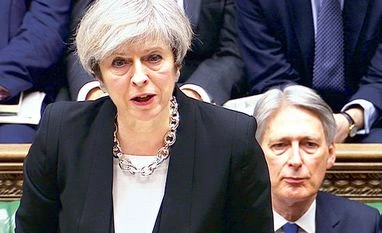What lies beyond Brexit? This is not just a question for the United Kingdom and the European Union, but also one that will reverberate around the world.
One answer is “the Anglosphere”.
Often spoken of as an alternative to the UK’s membership of the EU, the Anglosphere is the other side of the Brexit coin. But what is this novel ideology, which rose to prominence during the Brexit referendum? Where did it come from, and how will it affect Australia?
Emergence of the Anglosphere
The origins of the Anglosphere concept were first presented in the late 19th century.
Imperial federation was proposed as an alternative to growing instability within the British Empire and growing competition from external rivals (not least the US).
However, although having some influential friends such as one of Australia’s founding fathers, Alfred Deakin, the proposition lacked sufficient precision in terms of its form and purpose. The dream faded.
Nevertheless, the concept of the “English-speaking peoples” was not totally dead. Brief periods of political support manifested but quickly passed, particularly in pivotal moments of change.
During the second world war, and as the UK prepared to “abandon” its empire and join the European Economic Community, support for the English-speaking peoples as a political community was strengthened.
More recently, the Anglosphere has been advanced by an influential international alliance of predominantly conservative politicians, commentators and public intellectuals. This loose grouping shares an insurgent ideological and geopolitical agenda that informs ambitions for an alternative world order, including Britain’s withdrawal from the EU and the EU’s eventual collapse.
An opportunity for Britain
During the Brexit referendum, senior politicians in the “Leave” campaign – such as Nigel Farage, Michael Gove, Daniel Hannan, and David Davis – also made explicit reference to the potential of the Anglosphere.
The Anglosphere provided a point of commonality between the different groups supporting Brexit. But such commonality can be deceptive. British national self-interest has often overlooked the diverse geopolitical and economic interests of the Anglosphere’s other constituent countries.
The Anglosphere was one of the big winners of Brexit. Three of Theresa May’s ministers – Boris Johnson, Liam Fox and David Davis – are devotees of it, and are currently shaping Britain’s new place in the world.
In January 2017, May argued that Brexit afforded new opportunities for a “truly Global Britain” to re-imagine existing and new international relationships.
May said a “profoundly internationalist” post-EU Britain should draw on its distinctive national history and culture to become “the best friend and neighbour” to Europe, while also reaching out across the world “to build relationships with old friends and new allies alike”.
What does this mean for Australia and the world?
Proponents of “Global Britain” have often sought to support their vision by drawing attention to the potential for a series of trade deals to be quickly concluded across the Anglosphere once the UK leaves the EU.
May and US President Donald Trump have also sought to reframe the “special relationship” in the context of Brexit. They emphasised that stronger ties are founded “on the bonds of history, of family, kinship and common interests”.
However, there is a lack of consistency in terms of which countries actually constitute the Anglosphere. Many of the most vocal proponents have sought to frame the Anglosphere around a “network of core constituent Crown countries” that comprise Canada, Australia, New Zealand and the UK. Others have sought to frame it in terms of a new Anglo-American alliance re-asserting its global influence.
But outside of these so-called “core” Anglophone countries, it is not clear what place there is for, say, India, Ireland, Singapore or South Africa.
For many supporters, greater engagement with the Anglosphere is congruent with a desire to rejuvenate the Commonwealth, particularly India. Such designs reveal historical and contemporary complexities both in geopolitical relations between the core Anglosphere countries and the pervasive resonance of racism and neo-colonialism across parts of the former British Empire.
Trump’s America is seen both as pivotal and a potential threat to the free-trade foundations of a post-Brexit Anglosphere. Other critics have suggested that “Global Britain” is akin to “Empire 2.0”, founded on an overly positive vision of the colonial past and resting on a nostalgia-infused, post-imperial “amnesia”.
You don’t have to look far to find people like Australia’s current and former foreign ministers, Julie Bishop and Gareth Evans, who think this is a bad idea. Yet the Anglosphere has supporters in high places – notionally former Australian leaders Tony Abbott and John Howard. Like these figures, the Anglosphere currently remains influential yet marginalised.
But that’s what most people thought about Brexit a year ago. As British withdrawal from the EU shapes an emerging world order, its supporters think the Anglosphere is an idea whose time has come.
Andrew Mycock, Reader in Politics, University of Huddersfield and Ben Wellings, Senior Lecturer in Politics and International Relations, Monash University
This article was originally published on The Conversation. Read the original article.
To read the full story, Subscribe Now at just Rs 249 a month
Already a subscriber? Log in
Subscribe To BS Premium
₹249
Renews automatically
₹1699₹1999
Opt for auto renewal and save Rs. 300 Renews automatically
₹1999
What you get on BS Premium?
-
Unlock 30+ premium stories daily hand-picked by our editors, across devices on browser and app.
-
Pick your 5 favourite companies, get a daily email with all news updates on them.
Full access to our intuitive epaper - clip, save, share articles from any device; newspaper archives from 2006.
Preferential invites to Business Standard events.
Curated newsletters on markets, personal finance, policy & politics, start-ups, technology, and more.
Need More Information - write to us at assist@bsmail.in
)